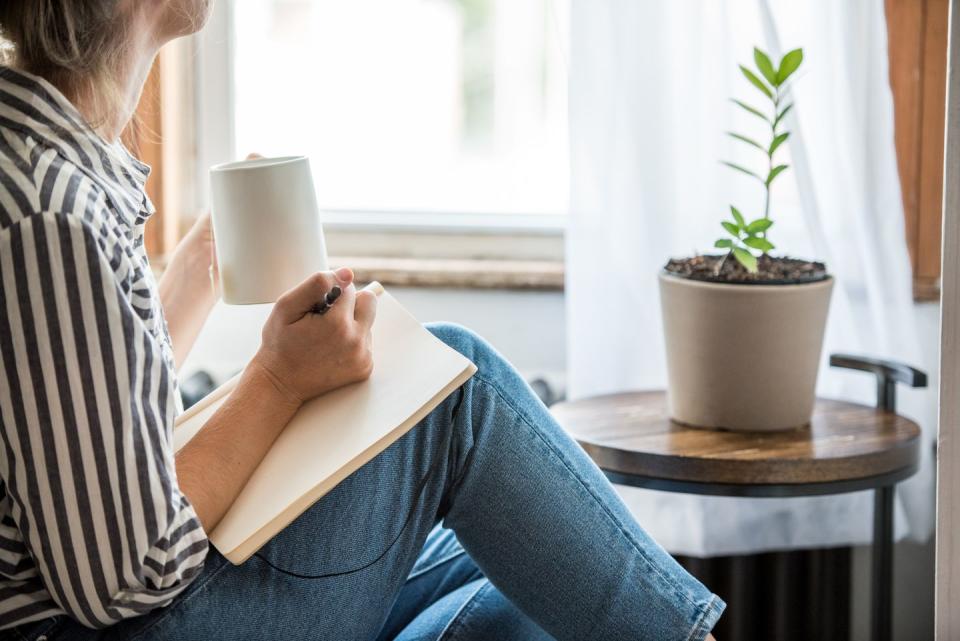5 ways to face and overcome Sunday anxiety head-on

For some, Sunday anxiety is part of their weekly routine. No matter how fulfilling the weekend has been, many can feel overcome when looking toward the week ahead.
According to 2022 research, more than two-thirds of Brits report work stresses, lack of sleep and looming to-do lists as the main causes of anxiety before the start of the working week. The study also highlighted that young adults are the worst affected, with 74% of those aged 18-24 experiencing heightened anxiety as the weekend comes to an end.
Why do we get Sunday anxiety?
"When it gets to Sunday night, you can start to feel blue and this is very normal," Jasmine Eskenzi, Founder of The Zensory, tells Country Living.
"Anxiety begins to creep in as your brain speeds through everything you have to do next week, you start to panic about how you'll get it all done, and your brain goes into overdrive. When this happens it's important to take a step back, breathe and re-centre yourself — don't let your brain run you into a panic."
How to overcome Sunday anxiety
1. Spend more time outside
Beating the 'Sunday Scaries' will take practice, especially if you have a bad case of them. A good way to calm your racing mind on a Sunday night is to spend more time outside during the day — whether it's a long countryside walk or a wander around your local park.
"Spending more time outdoors and in the fresh air will not only help reduce feelings of stress and anxiety, but the natural light will also help boost energy levels during the day and provide a contrast to dimly lit evenings, prompting our bodies to produce sleep hormones," Hannah Shore, Sleep Expert at Silentnight, tells us.
"A nice walk will not only boost your mood but you are more likely to fall asleep quicker on a Sunday evening."
With spring on its way, a good dose of sunshine will also help. Dr Katherine Hall, a Sleep Psychologist and expert at Happy Beds, adds: "Sunshine will regulate your internal clock alongside daylight hours, plus it could have some positive effects on your hormone cycles and body temperature too. If you're worried you don't get enough sunlight, you could also simulate sunshine with a SAD lamp."

2. Have a set bedtime — and stick to it
Having a set bedtime is not just for kids. A consistent sleep schedule will help to regulate your sleep-well cycle, leading to better quality sleep. "You may be enticed to stay up late on Sunday night as falling asleep makes Monday morning come even quicker, however this will only make your work week even harder to manage," explains Dr Katherine.
"It's important to have a set bedtime and to stick to it every night, or at least Sunday to Thursday night when you're more likely to be at work. Whilst going to sleep at a certain time may feel slightly childish, this routine helps your body regulate its natural clock and create a healthy sleeping pattern."

3. Prepare for the week ahead
Set aside time on Sunday to make plans for the week ahead. From meal prepping to tackling that pile of laundry, these will help to get your mind on the right track for the working week. Carve out some time on Sunday afternoon to pack your bag for the following day, put out your clothes, tidy up and prepare lunch.
"Feeling as prepared as possible will help you feel less nervous and more confident. At the beginning of each week, make a work schedule. Of course, things are bound to come up at the last moment, but outlining a list of tasks will stop you from feeling overwhelmed," Jan P. de Jonge, a psychologist working with Feel Good Contacts, says.
4. Journal
Journaling is an easy and effective solution. A night journal helps you put the day to bed, while also evaluating thoughts that are making you feel anxious. If you battle with Sunday anxiety, try writing in a journal, focussing specifically on positive events.
"A practice to add to your Sunday ritual is journaling. By writing down a list of things you want to do – or writing these things into a calendar – it can help you visualise what you need to do and see the reality of it," Jasmine adds.
"As part of this journaling session you can also write down the thoughts that are coming into your head that are making you feel anxious. By writing these down you are acknowledging them, which can help to break the thought cycle and lessen their affect in you. It's like scratching an itch."

5. Create a calming sleep environment
"Creating a calming sleeping environment is essential for helping us to feel rested ahead of a new week and enable us to feel more settled when it comes to bedtime on a Sunday evening," says Hannah.
"Find a pre-sleep routine which suits you and helps you relax and switch off the mind. Whether that's meditation, reading or listening to a podcast, anything which calms us will help promote a positive sleep environment."
Creating a relaxing sleep environment is very personal, however possibilities include changing your sheets, setting your room at the right temperature (studies say between 15.5 and 20 degrees celsius is ideal), lighting a relaxing candle, spritzing pillow spray, and limiting external and artificial light. Don't forget to keep your phone out of the room. An old-fashioned alarm clock will do.

A few other tricks for beating the Sunday blues include:
Try doing a 10 minute mindfulness meditation before going to bed
Plan something fun to do on Sundays and distract yourself with something you love doing
Log off. Mute your phone (including work emails) for the weekend.
Identify what's at the root of your anxiety – is there something you're avoiding? While some level of anxiety may be understandable, if you're suffering every week, it could also point to a deeper issue
If you're struggling with anxiety and it's impacting your enjoyment of everyday life, a therapist or your local GP can help you get to the root of the issue and equip you with tools to manage it
You Might Also Like

